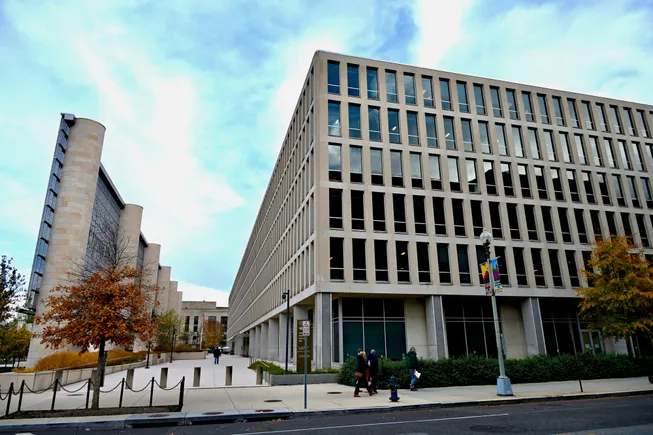

Florida governor Ron DeSantis is launching a state initiative to cut spending and optimize efficiency modeled after the Elon Musk’s federal Department of Government Efficiency, which has cut billions in contracts at federal agencies, The Orlando Sentinel reported.
Over the course of a year, Florida’s version of DOGE intends to sunset dozens of state boards and commissions, cut hundreds of jobs, and probe university finances and managerial practices.
“This is the DOGE-ing of our state university system, and I think it’s going to be good for taxpayers, and it’s ultimately going to be good for students as well,” DeSantis said Monday.
He added that the state would leverage artificial intelligence to help with the initiative.
The Republican governor also indicated that the state-level initiative would target what he referred to as “ideological study stuff” in an effort to “make sure that these universities are really serving the classical mission of what a university should be, and that’s not to impose ideology. It’s really to teach students how to think and to prepare them to be citizens of our republic.”
The move comes as the state has already targeted curriculum in recent months, stripping hundreds of courses from the general education offerings of state universities earlier this year. Many of the classes touched on topics such as race, gender, sexuality, and non-Christian religions.
Florida has also hired multiple GOP officials—some sitting, others who previously served—to lead state universities, including several who have no higher education management experience.
In a response to DeSantis, who pressed for the need to eliminate inefficiencies, the Florida Democratic Party noted that Republicans have controlled state politics for nearly 30 years and questioned the outgoing governor’s motivations in launching the state equivalent of DOGE.

The University of California Student Association’s request to block Department of Government Efficiency staffers from accessing student data at the Department of Education was denied Monday by a federal district judge.
The lawsuit, filed earlier this month, accused the department of illegally sharing confidential student data, arguing it violated the 1974 Privacy Act and confidentiality provisions of the Internal Revenue Code by giving DOGE access to records that contain tax information.
But Judge Randolph D. Moss of the District Court for the District of Columbia said there wasn’t an immediate threat, citing testimony from Adam Ramada, a DOGE staffer, who said that he and his team were only assisting the department with auditing for waste, fraud and abuse and that DOGE staffers understood the need to comply with data privacy laws.
“None of those initiatives should involve disclosure of any sensitive, personal information about any UCSA members,” Moss, an Obama appointee, wrote in his ruling. “The future injuries that UCSA’s members fear are, therefore, far from likely, let alone certain and great.”
Other higher education groups have raised concerns about DOGE’s access to education data, as the department’s databases house students’ personal information, including dates of birth, contact information and Social Security numbers. Some student advocates worry the data could be illegally shared with other agencies and used for immigration enforcement. Moss, however, called those harms “entirely conjectural,” saying Ramada had attested that the data was not being used in such ways.
Although the temporary restraining order was denied, the overall lawsuit will continue to work its way through the courts, and other legal challenges are emerging, The Washington Post reported.
A coalition of labor unions, including the American Federation of Teachers, is also suing to block DOGE’s access to the sensitive data. This latest lawsuit argues that agencies—including Education, Labor and Personnel Management—are improperly disclosing the records of millions of Americans in violation of the Privacy Act.

Every day brings revelations about how corrupt the US government is. Every day the Department of Government Efficiency ( DOGE) reports on one agency or another that they have taken over and plan to eliminate or downsize. The first targets were the USAID and the US Department of Education.
But this is just the beginning.
Every day is a spectacle, with Elon Musk and a handful of young men taking control over federal agencies. Some call it a coup, though President Trump has granted them the power through executive privilege. Others may call it a mission from God.
There is no telling how far this DOGE takeover will continue, but as long as folks are not protesting, we can expect it to last indefinitely. President Trump has recently mentioned corruption in the Department of Defense, which would be an interesting target to investigate.
In the meantime, President Trump has relaxed enforcement of US law banning bribery of foreign officials.
You can watch the DOGE boys in action through the DOGE tracker. You can also follow crypto trading and prices, which appear to be a key part of the DOGE movement.

UPDATE: Feb. 12, 2025: The U.S. Department of Education on Tuesday agreed to temporarily block staffers of the Department of Government Efficiency, or DOGE, from accessing student aid information and other data systems until at least Feb. 17.
On that date, a federal judge overseeing the case is expected to rule on a student group’s request for a temporary restraining order to block the agency from sharing sensitive data with DOGE.
President Donald Trump created DOGE through executive order on the first day of his second term, tasking the team, led by Tesla co-founder and Trump adviser Musk, with rooting out what the new administration deems as government waste.
DOGE has since accessed the data of several government agencies, sparking concerns that its staffers are violating privacy laws and overstepping the executive branch’s power. With the new lawsuit, the University of California Student Association joins the growing chorus of groups that say DOGE is flouting federal statutes.
One of those groups — 19 state attorneys general — scored a victory over the weekend. On Saturday, a federal judge temporarily blocked DOGE from accessing the Treasury Department’s payments and data system, which disburses Social Security benefits, tax returns and federal employee salaries.
The University of California Student Association has likewise asked the judge to temporarily block the Education Department from sharing sensitive data with DOGE staffers and to retrieve any information that has already been transferred to them.
The group argues that the Education Department is violating the Privacy Act of 1974, which says that government agencies may not disclose an individual’s data “to any person, or to another agency,” without their consent, except in limited circumstances. The Internal Revenue Code has similar protections for personal information.
“None of the targeted exceptions in these laws allows individuals associated with DOGE, or anyone else, to obtain or access students’ personal information, except for specific purposes — purposes not implicated here,” the lawsuit says.
The Washington Post reported on Feb. 3 that some DOGE team members had in fact gained access to “multiple sensitive internal systems,” including federal financial aid data, as part of larger plans to carry out Trump’s goal to eventually eliminate the Education Department.
“ED did not publicly announce this new policy — what is known is based on media reporting — or attempt to justify it,” Friday’s lawsuit says. “Rather, ED secretly decided to allow individuals with no role in the federal student aid program to root around millions of students’ sensitive records.”
In response to the Post’s Feb. 3 reporting, Musk on the same day posted on X that Trump “will succeed” in dismantling the agency.
Later that week, the Post reported that DOGE staffers were feeding sensitive Education Departmentdata into artificial intelligence software to analyze the agency’s spending.
The moves have also attracted lawmakers’ attention. Virginia Rep. Bobby Scott, the top-ranking Democrat on the House’s education committee, asked the Government Accountability Office on Friday to probe the security of information technology systems at the Education Department’s and several other agencies.
An Education Department spokesperson said Monday that the agency does not comment on pending litigation.

The Higher Education Inquirer continues to document the DOGE takeover of the US Department of Education.
While some Democratic officials in Congress have protested this action by DOGE, there has been little resistance otherwise.
DOGE consists of Elon Musk and several young men who have been tasked to reduce the federal budget by at least $1 Trillion. The US Senate has oversight of the Department of Education through the HELP (Health, Education, Labor, and Pensions) Committee, but Republicans, who are led by President Trump, control the Senate, and appear to be supporting these aggressive measures.
While Mr. Musk has claimed that the Department of Education no longer exists, its website is still operating.
DOGE also promotes the buying and selling of cryptocurrency.
